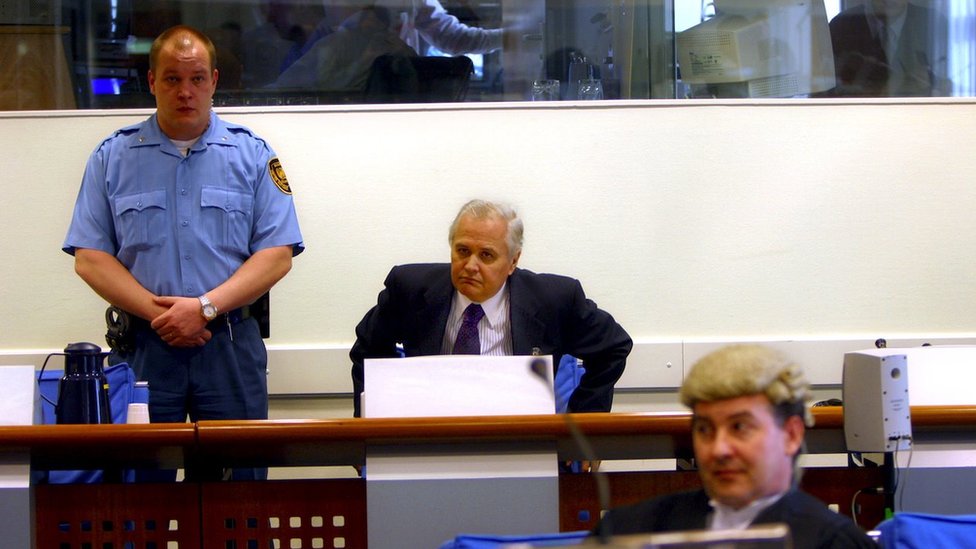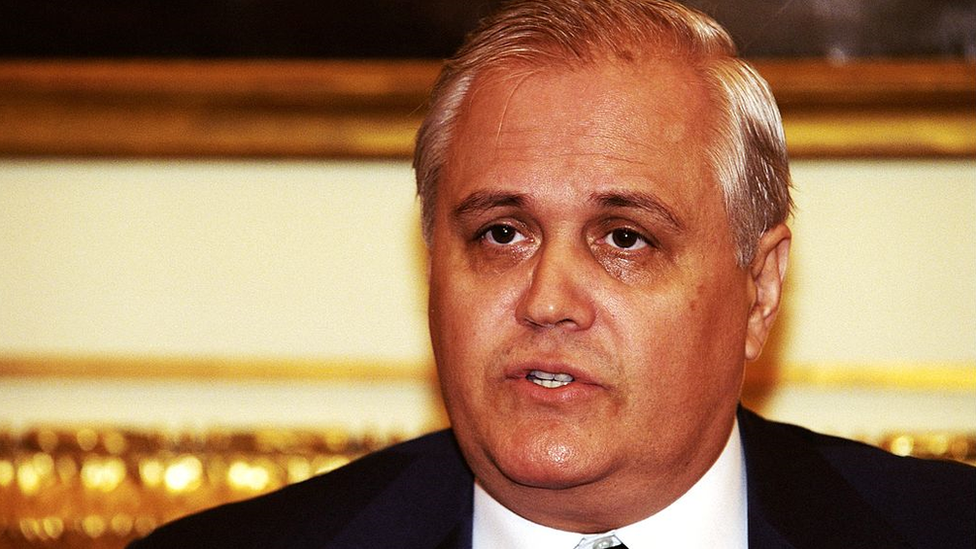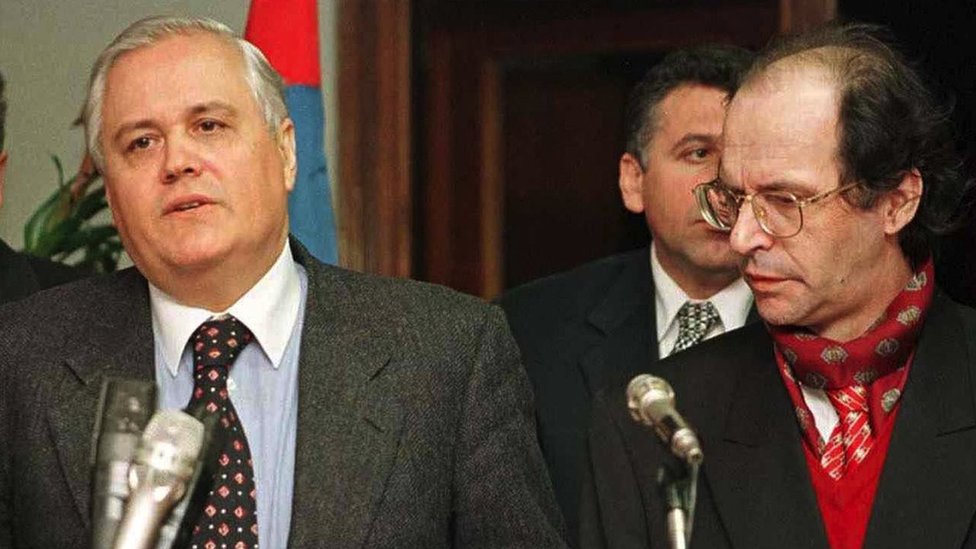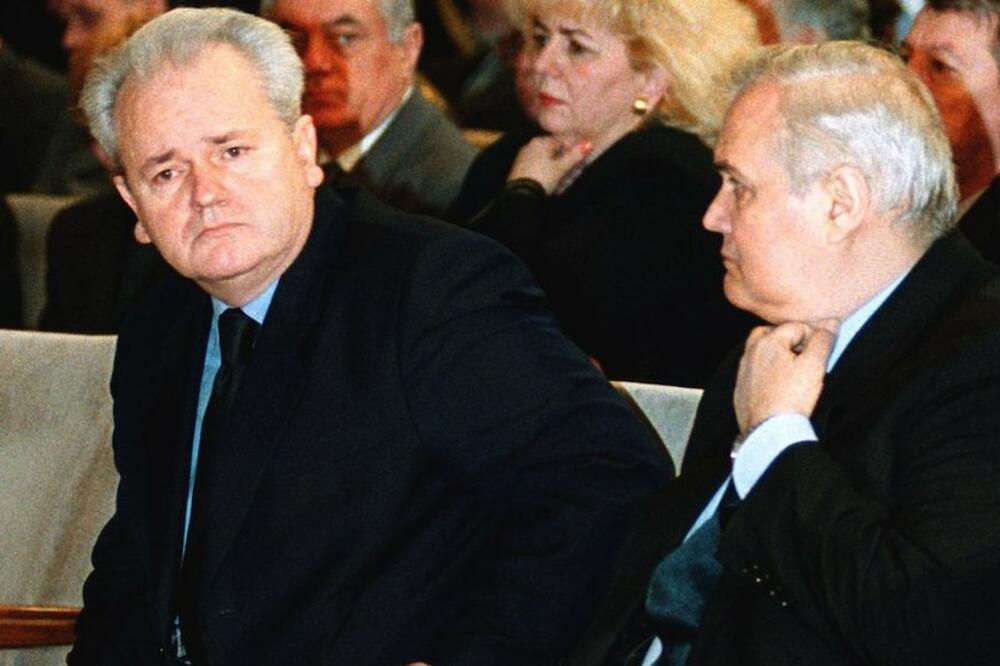"President who did not make decisions", "quiet and systematic intellectual", "career diplomat".
These are epithets used by contemporaries to describe the former president of Serbia, Milan Milutinović, who died at the age of 81.
During the tumultuous 1990s, Milutinović was an actor or witness to some of the most significant events in the modern history of Serbia and the Balkans, although it is difficult to assess how significant his role in them actually was.
Milutinović was the president of Serbia until 2002, and then surrendered to the Hague Tribunal, accused of crimes against humanity and violations of the rules of war during the conflict in Kosovo from 1998 to 1999.
He was acquitted of all charges in 2009.
He entered politics as a candidate of the Socialist Party of Serbia, the party led by Slobodan Milošević in that decade.
"Milutinović acted like a man who does not make decisions," says Božo Prelevic, one of the opposition co-ministers in the transitional government after October 5, 2000, when Milošević, then president of the Federal Republic of Yugoslavia, was ousted from power.
"He was a decent intellectual, but I blame him for not having the strength to influence Milosevic not to make decisions that cost this country so much," Prelevic assessed for the BBC in Serbian.
- How an American student wanted to bring peace to the Balkans: Milan Panić against Slobodan Milošević
- From "carrying boxes", through Bambiland to Moscow: Who is Marko Milošević
- Everything that marked the trial of Slobodan Milosevic and why it is important today
Since 1995, as the head of diplomacy of the Federal Republic of Yugoslavia, Milutinović participated in the reconciliation of the Dayton Agreement, which ended the war in Bosnia and Herzegovina.
As president of Serbia, he was a participant in the unsuccessful peace negotiations in Rambouillet between the political representatives of the authorities in Belgrade and the Kosovo Albanians in 1999.
He was one of the few Yugoslav officials who spoke to journalists from around the world who were following the peace conference in France.
"If he had asked himself, it would have been better for us, because as a man he was not ready for violence," believes Prelevic.
Nikola Šainović, former Prime Minister of Serbia and Deputy Prime Minister of Yugoslavia, assesses that Milutinović "was very persistent in what he started to push, as well as very systematic in solving delicate diplomatic tasks."
"He never raised his voice... He had breadth, not only intellectually, but also diplomatically," Sainović told the BBC.
"In the preparation of the negotiations, as an experienced diplomat and in accordance with the diplomatic craft, he knew how to collect a very large number of sources and information, make an analysis and assessment of reliability and summarize everything that is needed."
Šainović was sentenced by the Hague Tribunal to 22 years in prison for crimes committed during the conflict between Serbian security forces and Albanians in Kosovo, when hundreds of people were killed and hundreds of thousands had to leave their homes.

Diplomacy and Dayton
In 1989, Milutinović arrived in Greece as the new ambassador of the Socialist Federal Republic of Yugoslavia (SFRJ), where he remained until 1995, although one Yugoslavia ceased to exist in the meantime, and another was created, consisting of Serbia and Montenegro. .
It fell apart in the bloody war that started in Slovenia, spread to Croatia, and then to Bosnia and Herzegovina, where it gained the most terrible momentum.
And it wasn't easy to stop him.
After several unsuccessful diplomatic actions, at the end of 1995, the Dayton Peace Agreement was agreed, which Milutinović said had been developed since March of that year.
In August 1995, he became the Minister of Foreign Affairs of Yugoslavia.
"I talked with some American friends in Athens about Bosnia and said that the best solution is a conference, because all previous plans failed," Milutinović said about Dayton. in an interview for RTS in 2010.
"We created a text of basic principles where we said that there are two entities, three constituent peoples, we gave some basic guidelines about the federation and the entities, and we placed it on a page and a half."
That paper later, as he says, "grew to several pages" and then "became a book", so that the war would finally end.
By the Dayton Peace Agreement, Bosnia and Herzegovina was divided into two entities - the Federation of Bosnia and Herzegovina, which is predominantly inhabited by Bosniaks and Croats, and the Republika Srpska, with a majority Serb population.
Milutinović said that he was not a direct participant in the negotiations, and that his role was more logistical, but that he put pressure on the leadership of Republika Srpska to accept the agreement.
Along with Milosevic in Serbia
"Both Serbia and the world."
Under that slogan, at the end of 1997, Milutinović, as a candidate of the Socialist Party of Serbia, ran for president of Serbia.
More than a decade later, Milutinović said that he came up with that slogan himself, because he believed that one cannot do without the other.
"Serbia cannot be an isolated island, the overall political and human development must be constituted both internationally and nationally," he said then in an interview with RTS.
He reached candidacy, which was unusual for the Milosevic regime.
First, in September and October 1997, socialist candidate Zoran Lilić and radical leader Vojislav Šešelj faced each other.
Seselj won more votes than Lilic in the second round, but the elections were canceled due to low turnout.
In the repeated elections, the Socialists make a decision to change their own candidate - instead of Lilic, Milan Milutinović is running on the Seselj line.
Convincingly, with 61,2 to 38 percent of the votes, Milutinovic defeats the radical leader, who was later convicted before the Mechanism for International Criminal Courts in The Hague for crimes against humanity during the 1990s.
Milutinović "was appointed to that position as someone who will not interfere with Milošević, to protect his position", according to Prelevic.
"Milošević had people who were supposed to show a different face of the regime - which is not cruel, violent, unlike those others, thirsty for blood, and Milutinović was certainly not in favor of violence in any situation."
The previous president of Serbia, Milošević, became the president of the Federal Republic of Yugoslavia in the same year.

Rambouillet and negotiations
At that time, tension was growing in Kosovo and clashes between the Serbian security forces and the paramilitary Kosovo Liberation Army (KLA) were becoming more frequent.
Negotiations between the delegations of Belgrade and Pristina in Rambouillet were the last attempt by international diplomats to end the conflict.
"Serious negotiations began with the first arrival of the President of Serbia, Milan Milutinović, in Rambouillet," he writes Voice of the public in the text from 2000.
Milutinović was not an official member of the negotiating team, but many interpreted his arrival in the French town as a sign that Belgrade had finally decided to seriously accept diplomacy in Rambouillet, this paper writes.
"For many years out of sight, Milutinović suddenly found himself in the center of attention of the Serbian and international public, which he surprised with a relaxed and confident performance, rarely seen in Yugoslavian diplomacy until then".
"At press conferences in the old building of the Yugoslav residence, he answered every question, he moved lively among the numerous journalists, showing that relations with the public are not completely foreign even to official Belgrade."
Prelevic believes that Milošević and "Milutinović and some other people could have been used much more wisely".
"Milutinović had a useful value and probably could have done much more in diplomacy than as a president who doesn't ask about anything."
In April 1999 and at the height of the war in Kosovo, Milutinović met with Ibrahim Rugova, the long-time leader of the Kosovo Albanians, which was one of the few public meetings between the politicians of the two conflicting parties.
And years later, he kept a black leather box in his cabinet with mineral from the Trepča mine in Kosovo - a gift from Rugova.

Marti Ahtisari, the former president of Finland and special envoy of the United Nations for Kosovo, later wrote in the book "Mission in Belgrade" about the plan to negotiate Kosovo with Milutinović instead of Milosevic, which ultimately did not happen.
However, Šainović believes that it would not change anything.
"During that time of crisis, there was complete unity with the position of Yugoslavia, so the political and diplomatic work of Serbia and the FRY was integrated," says Šainović.
Milutinović himself once stated that "it was not realistic" for anyone but Milosevic to negotiate, saying that "it would be very difficult without him."
"I never had revolutionary ideas"., he said in one of the interviews.
Before the Hague Tribunal, several people from the state leadership of Serbia and Yugoslavia were convicted for war crimes committed in Kosovo, including Šainović, and military commanders Nebojša Pavković, Sreten Lukić, Dragoljub Ojdanić and Vladimir Lazarević.
Slobodan Milošević died in The Hague before the verdict was passed.
The fifth of October
Slobodan Milošević lost the elections for president of the Federal Republic of Yugoslavia to Vojislav Koštunica, the joint candidate of the united opposition on September 24, 2000, but he did not want to recognize the results.
Because of this, he was overthrown by protests on October 5.
Prelevic says that he was with Milutnovic during the night of the protest "in order to control the situation".
"We worked to ensure that nothing escalated and he had a rational attitude that contributed to no blood being spilled on October 5.
"It wasn't the deciding factor, but what it came down to, he did, and in that sense I'm very grateful to him."
Milutinović later confirmed that the leaders of the opposition "asked for support to prevent the worst from happening."
"I promised that, so it was a dramatic episode that ended well," he said in an interview with RTS
He traveled to The Hague for the trial before the Tribunal on a regular airline, without handcuffs, twenty days after leaving the office of President of Serbia.
"There was no fame, nor should there have been," he told RTS.
Follow us on Facebook,Twitter i Viber. If you have a topic proposal for us, contact us at bbcnasrpskom@bbc.co.uk
Bonus video:




